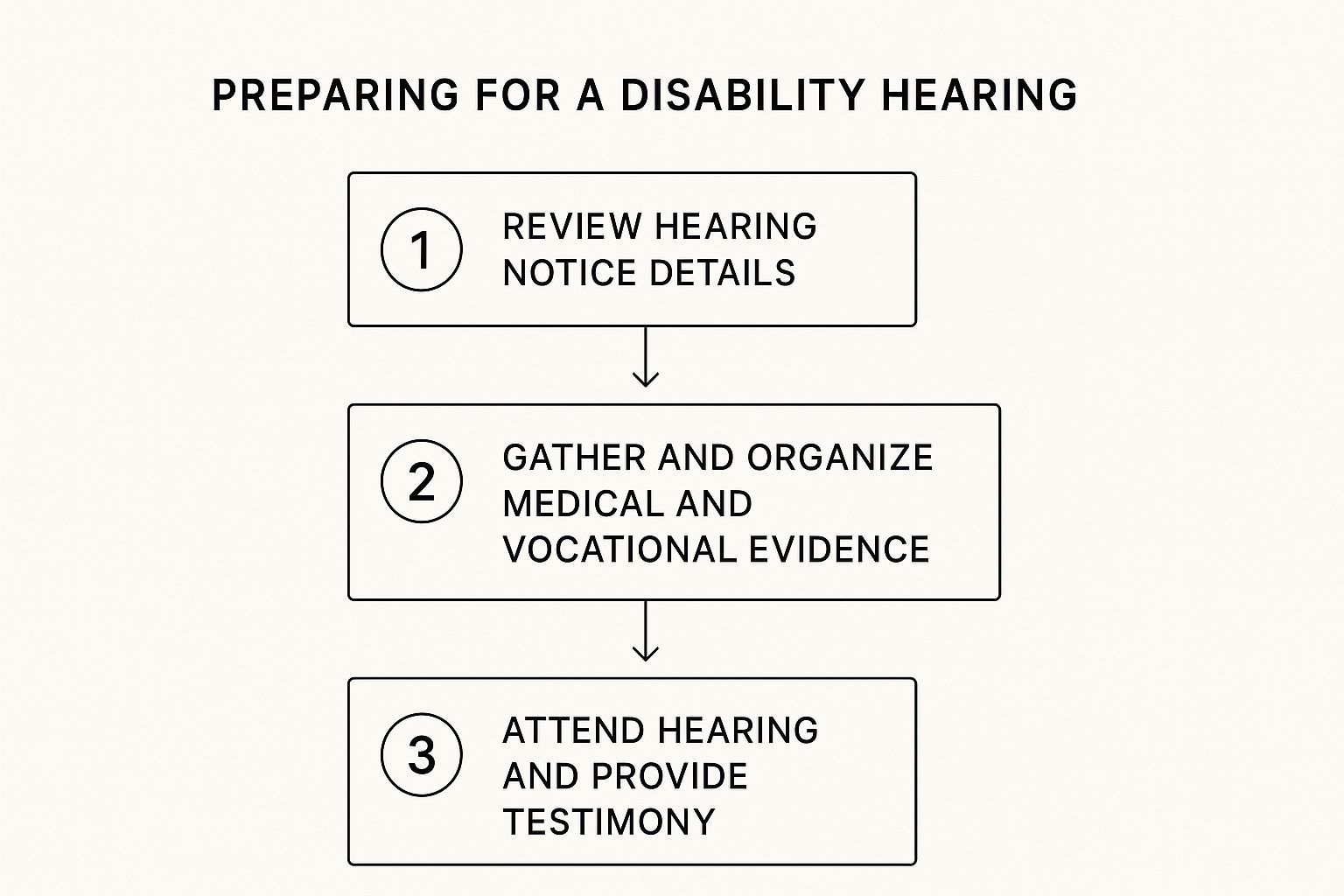How to Prepare for Disability Hearing: Expert Tips & Guide
"I was satisfied once John Bell took over my case."
"Communication was always timely."
How to Prepare for Disability Hearing: Expert Tips & Guide
Heading into a disability hearing can feel like you're staring up at a mountain. It’s intimidating, no doubt about it. But with the right strategy, it's a mountain you can climb. I've seen countless clients navigate this process, and the key always comes down to building a powerful case on four core pillars: a rock-solid medical record, genuine personal testimony, sharp legal counsel, and a firm grasp of what happens on hearing day.
Getting these four elements right is your roadmap to a successful outcome.
A Framework for Your Disability Hearing Preparation
Think of it this way: you're building a legal argument, and every piece needs to fit together perfectly. If one part is weak, the whole structure can become unstable. Your goal is to weave these components together to tell a clear, compelling story to the Administrative Law Judge (ALJ)—a story that demonstrates exactly how your condition keeps you from being able to work.
By breaking down your preparation into these distinct areas, you can stop feeling overwhelmed and start taking control. You'll be able to tackle each piece methodically, turning that sense of uncertainty into confidence.
Before we dive into the details, let's look at how these four pillars work together to build a strong foundation for your claim. This table breaks down what you need to focus on for each component.
Four Pillars of a Successful Disability Hearing
| 1. Medical Evidence | Provide objective, undeniable proof of your condition and its severity. | Gather all medical records, specialist reports, lab results, and imaging. Secure a detailed statement from your doctor outlining your specific functional limitations. |
| 2. Personal Testimony | Connect the medical facts to your real-life struggles. | Prepare to explain how your symptoms impact daily tasks and your ability to work. Think of specific, recent examples to share with the judge. |
| 3. Legal Counsel | Navigate the complex legal procedures and present your case effectively. | Work closely with your attorney to review evidence, prepare your testimony, and understand the legal arguments they will make on your behalf. |
| 4. Procedural Knowledge | Eliminate surprises and reduce anxiety on hearing day. | Learn the roles of everyone in the room (ALJ, experts) and understand the typical flow of questioning. This helps you stay calm and focused. |
Focusing on these four areas ensures that you've covered all your bases, leaving no room for doubt in the judge's mind. Now, let's break down why each of these is so critical.

This visual really drives home the point that preparation is a journey. It's not a single event, but a series of deliberate steps that lead you to the hearing, fully prepared to present your case.
Building a Medical Record That Speaks for You
When you're heading into a disability hearing, your medical file is your most powerful ally. I can't stress this enough. It’s not just a stack of papers; it's the core of your story, the objective proof that an Administrative Law Judge (ALJ) needs to see. The goal is to build a record so thorough and clear that it does the talking for you.
We're not just collecting documents here. We're building a narrative. The judge needs to understand more than just your diagnosis. They need to see the severity, frequency, and duration of your symptoms and, critically, how those symptoms make it impossible for you to work.

Prioritize High-Impact Medical Evidence
Let's be clear: not all medical records are created equal. While your entire history matters, some pieces of evidence carry far more weight with a judge. You want to zero in on the documents that paint a clear, objective picture of your functional limitations.
Your attorney will be instrumental in tracking down the most critical records, but it helps if you know what the judge is looking for.
- Reports from Specialists: Opinions from experts like rheumatologists, neurologists, or orthopedic surgeons are gold. An ALJ gives these significant weight because they come from doctors who specialize in your specific condition.
- Objective Test Results: This is your hard evidence—MRIs, CT scans, X-rays, nerve conduction studies, and detailed blood work. These tests provide concrete proof that backs up your subjective complaints of pain or weakness.
- Physician Opinion Letters: A detailed letter or a "Residual Functional Capacity" (RFC) form filled out by your treating doctor can be a game-changer. This isn't just about the diagnosis; it needs to spell out your specific limitations. For example, it might state you can't lift more than 10 pounds, stand for longer than 15 minutes, or maintain focus for extended periods.
- Therapy Notes: Consistent notes from physical therapy, occupational therapy, or counseling sessions show your ongoing efforts to get better. They also create a detailed timeline of your functional abilities, which is exactly what a judge needs to see.
An ALJ is essentially piecing together the timeline of your disability. A complete, up-to-date medical record showing consistent treatment and worsening symptoms is far more persuasive than a few scattered, old reports. Gaps in your treatment history can easily be misinterpreted as periods of improvement.
From Diagnosis to Functional Limitation
Simply having a diagnosis—like degenerative disc disease—won’t win your case. You have to connect the dots for the judge, showing exactly how that condition prevents you from performing work-related tasks. This is where the details in your medical records become crucial.
For instance, a weak record might just note, "Patient has chronic back pain."
A strong record, on the other hand, will say something like, "Patient’s MRI from May shows severe spinal stenosis at L4-L5. Due to radiating nerve pain, the patient is unable to sit for more than 20 minutes without needing to stand or reposition. They cannot lift, carry, or push objects weighing more than 15 pounds."
See the difference? The second example provides the judge with specific, measurable limitations they can use to determine if any jobs exist that you can perform. That level of detail is absolutely essential. For a deeper dive, you can learn more about the requirements for Social Security Disability benefits and how these limitations are evaluated.
The Importance of Consistent Treatment
Following your doctor's orders is non-negotiable. Sticking to your medication schedule, showing up for therapy, and making it to every follow-up appointment demonstrates to the ALJ that you're actively trying to improve your condition. If you stop treatment, a judge might assume you've either gotten better or that your condition isn't as severe as you claim.
This consistent effort is especially critical when you consider the statistics. Only about 35% of initial SSDI claims are approved. But that number jumps to around 50% at the hearing level. For certain conditions backed by strong objective evidence, like multiple sclerosis, the approval rate can go from 68% initially to 80% after a hearing.
Your diligent record-keeping directly impacts your chances of being in that successful group. A well-documented file gives your attorney the ammunition they need to build a winning case at this make-or-break stage.
The Strategic Advantage of Legal Representation

Trying to navigate a disability hearing on your own is a huge gamble. The system is loaded with complex rules and procedures where one small mistake can unravel your entire claim. This is precisely where a good disability attorney becomes more than just a helper—they become your most essential strategic partner.
An experienced lawyer brings a trained legal eye to your case. They understand what Administrative Law Judges (ALJs) are looking for and, more importantly, what will weaken your argument. They can spot potential problems in your file long before the hearing and build a strategy to tackle them head-on.
From Legal Briefs to Expert Cross-Examination
One of the most effective tools in an attorney's arsenal is the pre-hearing legal brief. Think of it as a detailed roadmap to approval, submitted to the judge before you even walk into the hearing room. This document lays out the facts, connects them to your medical records, and applies Social Security’s own rules to argue why you should be approved.
Once you’re in the hearing, your attorney’s role shifts into high gear. They'll have prepared you for the judge's questions, so you can explain your limitations clearly and consistently. But their most critical job is often handling the cross-examination of the Vocational and Medical Experts—this is where many cases are won or lost.
Here’s a real-world example of how that plays out:
A Vocational Expert (VE) takes the stand and testifies that you could still work as a "surveillance system monitor." To you, it sounds like your case is over. But your attorney sees an opening.
A skilled lawyer knows exactly how to challenge that testimony with pointed questions:
- "Doesn't that job require a person to stay focused for a full eight-hour shift without interruption?"
- "My client's records show their pain medication causes severe drowsiness. How would that affect their ability to remain alert?"
- "Would a typical employer accommodate someone who needs to lie down for 20 minutes every two hours, as my client's doctor has ordered?"
Through this line of questioning, the attorney can get the VE to admit that, in reality, no jobs exist for someone with your specific combination of limitations. This completely dismantles the argument that you can still work. Wondering if you are in a position where you might need a lawyer for your disability claim? This kind of expert cross-examination is a perfect example of the value they bring to the table.
The Statistical Proof of Representation
The numbers speak for themselves. Having legal counsel dramatically tilts the odds in your favor. In one study, claimants with an attorney were twice as likely to get approved: a 50% approval rate with representation versus just 23% for those who went it alone.
Government data paints an even clearer picture, showing that represented claimants are nearly three times more likely to be awarded benefits. This isn't a coincidence; it's proof that an attorney’s expertise significantly increases your chances of winning. For more details on these statistics, you can review the odds of winning your disability hearing on disabilitysecrets.com.
Understanding the Contingency Fee Structure
The fear of high legal fees stops many people from getting the help they need. The good news is that nearly all Social Security disability attorneys work on a contingency fee basis.
This arrangement means you pay absolutely no upfront costs.
The attorney’s fee is taken directly from your back pay—the lump-sum payment of benefits you are owed from the time you became disabled. The Social Security Administration (SSA) strictly regulates these fees. They are capped at 25% of your back pay or $7,200, whichever amount is less.
It’s a simple, risk-free model for you. If you don’t win your case, you owe your attorney nothing. This ensures your lawyer is just as invested in winning as you are.
Telling Your Story: How to Give Powerful Testimony
Your medical records lay out the clinical facts, but your testimony is where your story comes alive. This is your chance to connect the dots for the Administrative Law Judge (ALJ), painting a clear, human picture of how your condition genuinely impacts your daily life. Think of it as translating a diagnosis from a piece of paper into the real-world challenges you face every single day.
A judge needs to understand why you can't work. The most effective way to help them understand is by sharing specific, honest examples from your life. The difference between a vague claim and a detailed account can be the very thing that wins your case.

From Symptoms to Specific Limitations
Simply saying "my back hurts" won't cut it. Honestly, judges hear that dozens of times a week. It doesn't give them anything to work with. Your job is to provide the context—the details that show just how severe your pain is and how it hobbles your ability to function.
Let's look at the difference.
- Weak Statement: "I have chronic pain, so I can't work."
- Powerful Statement: "The sharp, shooting pain in my lower back makes it impossible to sit for more than 15 minutes at a time. I have to get up and pace, or even lie down on the floor, just to get some relief. There’s no way I could stay at a desk for a full workday."
See the difference? The second example gives the judge a concrete, measurable limitation they can use when assessing your work capacity. That’s the level of detail you're aiming for. Knowing how to write compelling content when you speak is what will make your testimony resonate.
Answering the "Typical Day" Question
One of the first and most important questions an ALJ will likely ask is, "Walk me through a typical day for you." This isn't just small talk. It’s a strategic question designed to get a real-world look at your daily activities and limitations. An unprepared answer here can accidentally sink your case.
Don't just give a vague summary. Guide the judge through your day, hour by hour, highlighting the struggles you face.
A weak answer sounds like this:
"Well, I get up, eat something, and maybe watch TV. I don't really do much."
A strong answer paints a picture:
"I usually wake up around 8 a.m., but it takes me about 45 minutes just to get dressed. The stiffness and pain in my hands make buttoning a shirt a huge challenge. After I manage a simple breakfast, I have to go rest on the couch for at least an hour because the morning exhaustion just completely wipes me out."
This kind of detailed answer immediately demonstrates significant limitations before the day has even really begun.
Be straight about your good days and your bad days. If you try to exaggerate, you'll lose your credibility fast. The judge knows that most chronic conditions fluctuate. Being honest about this reality makes everything else you say that much more believable.
Honesty Is Everything
Everything you say in your testimony must line up with the information in your medical records and application paperwork. The ALJ has your entire file right there in front of them, and they are experts at spotting inconsistencies. If you testify that you can’t lift more than five pounds, but a note from your physical therapist mentions you lifted a ten-pound weight, that's a red flag for the judge.
This is where having an attorney is invaluable. They'll help you practice your testimony, making sure your answers are not only truthful but also framed clearly and effectively.
Keep these key takeaways in mind:
- Be Specific: Use numbers, timeframes, and real-life examples whenever you can. How long can you stand? How far can you walk?
- Don't Exaggerate: Stick to the unvarnished truth. Your credibility is your most valuable asset in that hearing room.
- Focus on What You Can't Do: It’s not just about what hurts. It’s about explaining how that pain stops you from performing tasks.
Ultimately, in a process that can feel incredibly impersonal, your testimony is your voice. Preparing to tell your story with authentic, detailed, and honest examples is one of the most critical parts of preparing for your disability hearing. It adds the human element that no stack of medical records ever could.
What to Expect on Your Hearing Day
Walking into your disability hearing—or logging in from home—can feel incredibly intimidating. But knowing what’s going to happen, step-by-step, can make all the difference. It helps you take a deep breath, focus, and transform a scary event into a manageable one. This is your chance to tell your story directly to the judge, and understanding the day's roadmap is a huge part of being prepared.
First, let's get one thing straight: this isn't like a courtroom drama on TV. The setting is usually just a simple conference room. There's no jury box, no gallery of spectators. The judge's goal isn't to put you on trial; it's to gather the facts they need to make a fair decision about your case.
Who Will Be in the Room?
When the hearing starts, you'll see a few key people, either in person or joining by video. Each one has a very specific job to do.
- The Administrative Law Judge (ALJ): This is the person who runs the show. The ALJ will ask questions, guide the hearing, and ultimately be the one who decides to approve or deny your claim.
- Your Attorney: Your lawyer is your advocate. They're there to present your case in the best possible light, ask you questions that highlight your struggles, and challenge the testimony of any expert witnesses.
- The Hearing Reporter: This individual's job is to create an official audio recording of everything said. They might ask you to speak up or repeat something to ensure the record is clear.
- A Vocational Expert (VE): The Social Security Administration hires this impartial expert to give testimony about the job market. They'll talk about job requirements and whether someone with your specific set of limitations could realistically hold any of them down.
- A Medical Expert (ME): You won't always see an ME, but sometimes a doctor or psychologist joins to help the judge interpret complex medical evidence in your file.
Knowing who's who helps take the mystery out of the process. Instead of wondering what everyone is doing, you can concentrate on what matters most: your testimony.
The hearing is truly your best opportunity for approval. While a staggering 62% of initial SSDI applications get denied, the approval rate at the hearing level jumps to 51%. This is the first point in the process where you're actually more likely to be approved than denied, all because you get to explain your situation to a real person. You can learn more about the chances of winning at a disability hearing on oneilandbowmandisability.com.
The Typical Flow of a Disability Hearing
Every judge has their own personal style, but most hearings follow a pretty standard script. Knowing the general order of events can keep you from feeling caught off guard.
Getting Started
The ALJ will kick things off by introducing everyone and briefly explaining why you're all there. Your attorney might also make a short opening statement, laying out the roadmap for why the evidence supports your claim.
Your Testimony
This is the heart of the hearing. The judge, and then your attorney, will ask you questions about your medical conditions, your past work, and most importantly, how your symptoms limit you on a day-to-day basis. All the preparation you did to articulate your story will come into play right here.
Expert Testimony
If a Medical Expert is present, they’ll testify after you. They'll give their professional opinion based on a review of your medical records. Your attorney gets to ask them questions, too.
Near the end, the Vocational Expert will testify. The judge will ask the VE a series of "what if" questions.
For example, the judge might ask, "Imagine a person of the claimant's age and education who can't lift more than 10 pounds and needs to switch between sitting and standing every 30 minutes. Are there any jobs this person could do?"
Wrapping Up the Case
After the VE answers, it's your attorney's turn. They will cross-examine the VE, often adding more of your specific limitations into the judge's hypothetical questions to show that, in reality, there are no jobs you can perform. This is often where a sharp attorney can win a case.
To finish, your attorney may give a quick closing argument, tying everything together. The judge will then officially end the hearing. Just know that you will not get a decision that day. You'll have to wait for it to arrive in the mail, which usually takes a few months.
Common Questions About Your Disability Hearing
As your hearing date gets closer, it's completely normal for a new set of questions and worries to bubble up. Getting a handle on the practical details can ease your mind and help you focus on what really matters—presenting your case clearly.
Let’s walk through some of the most frequent questions we hear from clients as they get ready for this important day.
How Should I Dress for My Disability Hearing?
The best advice is to dress neatly and conservatively. Think of it like you're going to a professional office job. Business casual is always a safe bet—a collared shirt, slacks, or a modest blouse and skirt all work perfectly.
The goal isn't to impress the judge with your fashion sense; it's to show that you take the process seriously. You'll want to avoid anything that could be distracting, like t-shirts with graphics, shorts, sandals, or hats.
This advice is just as crucial for virtual hearings as it is for in-person ones. A respectful appearance helps the judge focus on the facts of your case, not on your clothing choices.
What Kind of Questions Will the Judge Ask Me?
The judge’s questions are all designed to build a complete picture of your medical conditions, your work history, and—most importantly—how your impairments limit you day-to-day. They are trying to determine your "Residual Functional Capacity" (RFC), which is a formal way of saying what you can still do despite your health problems.
Be prepared to answer questions that dig into these key areas:
- Your Condition: "When did your symptoms first begin?" or "What activities make your pain worse?"
- Daily Life: "Can you walk me through a typical day, from the time you wake up until you go to bed?"
- Work History: "What were the specific physical and mental demands of your last job?"
- Your Limitations: "Tell me about the specific symptoms that prevent you from being able to work now."
Your attorney will go over these types of questions with you. The key is to be honest, specific, and to make sure your answers are consistent with the information in your medical records.
Should I Bring a Family Member to My Hearing?
While you can absolutely bring a family member or friend with you for emotional support, they will almost always be asked to wait outside the hearing room. They can’t sit in on the proceedings unless they are scheduled to testify as a witness.
Having a witness can be a powerful tool in some cases. If a family member has firsthand knowledge of your daily struggles—for example, if they have to help you with personal care or have seen you fall—their testimony could add significant weight to your case.
However, this is a strategic decision that must be made in advance with your attorney. Your lawyer will determine if a witness's testimony will actually help and will prepare them for questioning. Never bring a surprise witness. Unplanned testimony can easily do more harm than good if it introduces inconsistencies or irrelevant information.
The decision to include witness testimony is a calculated one. A well-prepared witness can provide compelling, corroborating evidence of your limitations. An unprepared one can accidentally contradict your testimony and undermine your credibility with the judge.
What Happens After the Disability Hearing Is Over?
One of the most important things to prepare for is that you will not get a decision on the day of your hearing. That almost never happens. The Administrative Law Judge (ALJ) needs time to carefully review all the evidence—your testimony, your thick file of medical records, and the opinions of any experts.
After the hearing, the judge writes a formal, detailed decision. This document is typically mailed to you and your attorney within 60 to 90 days, though this timeframe can sometimes be longer depending on the judge's caseload.
If your claim is approved, the decision will state your official disability onset date and provide information about when you can expect to receive benefits and any back pay you are owed.
If your claim is denied, the letter will explain the judge's reasoning. It's crucial not to panic if this happens. The decision will also outline your right to appeal. For more information, you can read our guide on what to do if your disability claim is denied, which explains the next steps in the process.
This waiting period can be one of the most stressful parts of the process, but it's completely standard. It's essential to continue with all your medical treatment as prescribed while you wait.
At Bell Law, our experienced attorneys are dedicated to guiding Oregon residents through every stage of the Social Security Disability process. We understand the system and are here to help you prepare the strongest case possible for your hearing. If you're feeling overwhelmed, contact us for skilled and compassionate representation at https://www.belllawoffices.com.
Disclaimer: The information on this page is provided for general informational purposes only and is not legal advice. Reading this content does not create an attorney-client relationship. For advice about your specific situation, please contact a licensed attorney.







